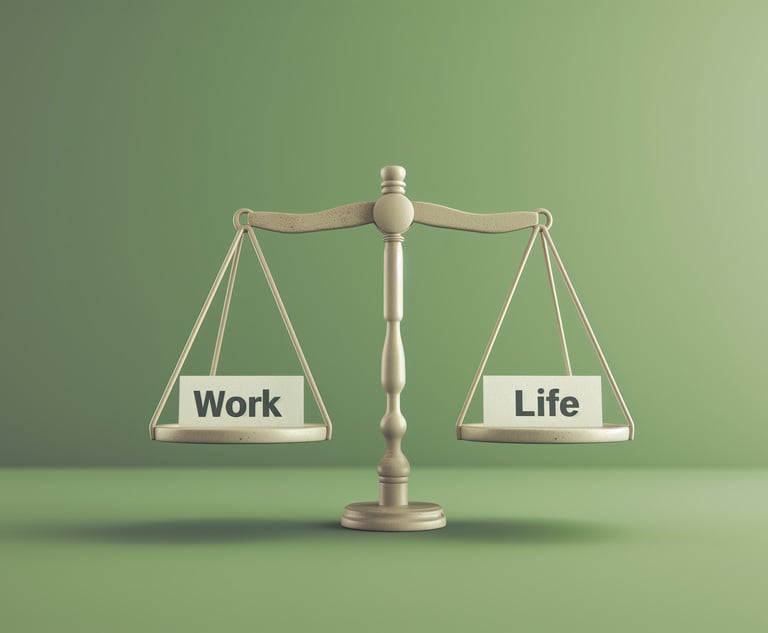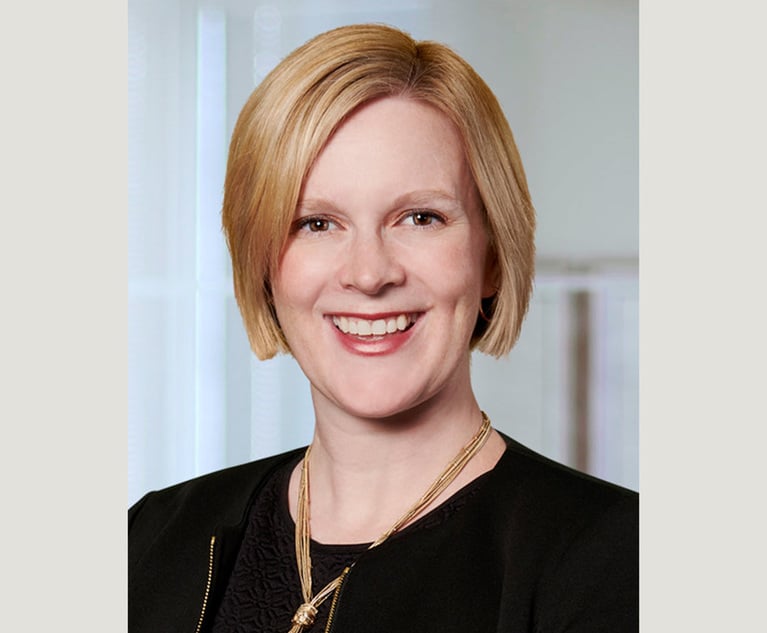The Legal Profession's Very Real Impact on Personal Relationships
With so much pressure from their jobs, lawyers' often don't have time or the mental capacity to deal with their personal relationships. Psychotherapist James Dolan, who treats a number of lawyers, calls it Work Induced Alienation Syndrome.
May 12, 2019 at 07:00 PM
6 minute read
Margaret kept her expression blank but her eyes reddened slightly and pooled with tears. "May I have a tissue?" she asked, gesturing at the large box on my office coffee table. "Sure," I said. "That's what they're for."
"It's going down hill, for sure … no, not going downhill. We're already there. We're just living in the wreckage. We just don't talk about it, because, we quote don't have the time, unquote. 'Now's not the time,' he'll say. 'I'm leaving for wherever in the morning for a deposition and I don't want all this in my head while I'm doing it.'" She looked at me, her face and eyes questioning for an answer I didn't have. She went on.
"We don't have time for anything…for some reason. He gets home on a Thursday evening, I've been cooking dinner and helping the kids with homework. He goes right away to his study, comes out and starts in on me about why the house isn't clean and dinner is cold and the kids ignored him and on and on, like all I do when he's gone is watch Netflix and have lunch with friends."
"That sounds like a lot of fun. You're making me jealous," I said. A lawyer's spouse, she caught the irony. "He just seems angry all the time. I get tired of it. I try to get him to talk about it, but we never get anywhere, and then it's time for him to go again. I think we both know it's over, but it's hard to admit, and there's so much emotion there…" Her voice trailed off.
What Margaret was talking about was a condition I've come to think of as Work Induced Alienation syndrome. It starts with the extraordinary demands contemporary law practice places on its human capital. The frequency of travel, or of 'being in trial' creates the emotional labor of detaching, then re-attaching, with each cycle incrementally lowering either spouse's tolerance for it. Eventually, they opt for a default 'gray middle' where the other is simply a two-dimensional billboard with the word 'Spouse' on it. Neither wants the emotional labor of the attachment/detachment cycle, yet they each, in their own private ways long for connection, meaning, acceptance. The amount and intensity, and often, the sheer boredom of legal work seems to overwhelm many, forcing them into making a deal with destiny in which real life in the moment is traded off for the demands of the job.
It is a job that can easily take 12 or 15 hours a day, and often more. Lawyers are encouraged and supported to take on this death wish workload because that is how they climb and become that indispensable provider that is the envy of subordinates. Stress, burnout, failed relationships, are simply the collateral damage, the necessary consequences of success, if it is ever attained at all in the current definitions of success. And, those who don't meet it suffer all the same, along with the shame of perceived failure.
Margaret's husband, Joe, was a first year partner, playing the game the way it's supposed to be played in the standard formula for success. And, he was succeeding…at his job, but was failing everywhere else. Analysis of this would show he had no choice, really, if he was to accomplish what he hoped to at work.
What's going on?
Contemporary law practice, implicitly and explicitly, asks lawyers to make it their only priority. There is an inbuilt fear that says if you don't make it your only priority, you'll lose out, you'll be a failure. So lawyers like Joe accept this wholeheartedly, without thinking. Work Induced Alienation Syndrome is only a few years away, and with it, the loss of relationship, of connection, of meaning, of the enjoyment of the one and only life one ever will have. Burnout, depression, despair and in some cases, suicidal thoughts are the spawn of this alienation.
What Can Margaret and Joe do?
When the Syndrome has fully set in, it is very difficult to reverse, but it can be done. This is when ritual is called for, to replace the muffled, soul deadening and unacknowledged emotional labor of detaching and reattaching. With ritual, the unspoken is made explicit. Joe and Margaret would be asked to imagine how they'd like life to be, what is liked and not liked. They can then turn this info into a deliberate ritual of detaching and reattaching, feelings are discussed, the bittersweet of leaving, the joy of returning. Lemons are turned to lemonade.
But, much better would be to acknowledge ahead of time the enormity of the task at the outset of a career. I recently appeared on a panel discussion at University of North Texas Law School on 'Mental Health Issues in Law Practice' for the 1L and 2L students. Our point was that a legal career, like military/police/first responder, is one with known stressors and emotional dangers that that WILL come to play, especially in the early years of a career. It is in those years that a proactive plan can be put in place, including the rituals (like bedtime stories for kids), that can inure a marriage and family to the dangers of a legal career run amok.
The best stress management strategies are those already in place when the stress mounts. So instead of looking for quick fixes like aspirin for stress/anxiety, the activities and attitudes are already there and built in. This means having a life that includes law practice, not one that IS law practice. Regular exercise, whether there is 'time' or not, meaningful activities away from law (bowling league, knitting circles, book club, record collecting, you name it), time with family, kids and friends, all of this should be seen not as an onerous obligation but rather as inoculation against the isolating, corrosive and dangerous levels of stress in all levels of law practice.
The kicker here is that these solutions are ever present, readily available and pretty obvious. The only problem I encounter when working with lawyers, male or female, is getting them to actually deploy the solutions and live by them. Maybe that is a topic for another column.
James Dolan, MA, LPC is a Dallas psychotherapist and coach who helps lawyers and non-lawyers with anxiety, depression, burnout and relationship problems at work and at home. To find out more visit www.therapistjamesdolan. com, or email [email protected].
This content has been archived. It is available through our partners, LexisNexis® and Bloomberg Law.
To view this content, please continue to their sites.
Not a Lexis Subscriber?
Subscribe Now
Not a Bloomberg Law Subscriber?
Subscribe Now
NOT FOR REPRINT
© 2025 ALM Global, LLC, All Rights Reserved. Request academic re-use from www.copyright.com. All other uses, submit a request to [email protected]. For more information visit Asset & Logo Licensing.
You Might Like
View All
Long Hours and Lack Of Boundaries: Associates In India Are Leaving Their Firms

‘Extremely Disturbing’: AI Firms Face Class Action by ‘Taskers’ Exposed to Traumatic Content
5 minute read
How My Postpartum Depression Led to Launching My Firm’s Parental Leave Coaching Program
9 minute readTrending Stories
- 1The Lawyers Waging the Legal Fight Against the Trump Administration
- 2McDermott's Onetime London Leader Headed to Pillsbury
- 3A&O Shearman To Lose Another Five Lawyers to EY
- 4Pearl Cohen Enters San Francisco Market Via Combination With IP Boutique
- 5'Incredibly Complicated'? Antitrust Litigators Identify Pros and Cons of Proposed One Agency Act
Who Got The Work
J. Brugh Lower of Gibbons has entered an appearance for industrial equipment supplier Devco Corporation in a pending trademark infringement lawsuit. The suit, accusing the defendant of selling knock-off Graco products, was filed Dec. 18 in New Jersey District Court by Rivkin Radler on behalf of Graco Inc. and Graco Minnesota. The case, assigned to U.S. District Judge Zahid N. Quraishi, is 3:24-cv-11294, Graco Inc. et al v. Devco Corporation.
Who Got The Work
Rebecca Maller-Stein and Kent A. Yalowitz of Arnold & Porter Kaye Scholer have entered their appearances for Hanaco Venture Capital and its executives, Lior Prosor and David Frankel, in a pending securities lawsuit. The action, filed on Dec. 24 in New York Southern District Court by Zell, Aron & Co. on behalf of Goldeneye Advisors, accuses the defendants of negligently and fraudulently managing the plaintiff's $1 million investment. The case, assigned to U.S. District Judge Vernon S. Broderick, is 1:24-cv-09918, Goldeneye Advisors, LLC v. Hanaco Venture Capital, Ltd. et al.
Who Got The Work
Attorneys from A&O Shearman has stepped in as defense counsel for Toronto-Dominion Bank and other defendants in a pending securities class action. The suit, filed Dec. 11 in New York Southern District Court by Bleichmar Fonti & Auld, accuses the defendants of concealing the bank's 'pervasive' deficiencies in regards to its compliance with the Bank Secrecy Act and the quality of its anti-money laundering controls. The case, assigned to U.S. District Judge Arun Subramanian, is 1:24-cv-09445, Gonzalez v. The Toronto-Dominion Bank et al.
Who Got The Work
Crown Castle International, a Pennsylvania company providing shared communications infrastructure, has turned to Luke D. Wolf of Gordon Rees Scully Mansukhani to fend off a pending breach-of-contract lawsuit. The court action, filed Nov. 25 in Michigan Eastern District Court by Hooper Hathaway PC on behalf of The Town Residences LLC, accuses Crown Castle of failing to transfer approximately $30,000 in utility payments from T-Mobile in breach of a roof-top lease and assignment agreement. The case, assigned to U.S. District Judge Susan K. Declercq, is 2:24-cv-13131, The Town Residences LLC v. T-Mobile US, Inc. et al.
Who Got The Work
Wilfred P. Coronato and Daniel M. Schwartz of McCarter & English have stepped in as defense counsel to Electrolux Home Products Inc. in a pending product liability lawsuit. The court action, filed Nov. 26 in New York Eastern District Court by Poulos Lopiccolo PC and Nagel Rice LLP on behalf of David Stern, alleges that the defendant's refrigerators’ drawers and shelving repeatedly break and fall apart within months after purchase. The case, assigned to U.S. District Judge Joan M. Azrack, is 2:24-cv-08204, Stern v. Electrolux Home Products, Inc.
Featured Firms
Law Offices of Gary Martin Hays & Associates, P.C.
(470) 294-1674
Law Offices of Mark E. Salomone
(857) 444-6468
Smith & Hassler
(713) 739-1250










